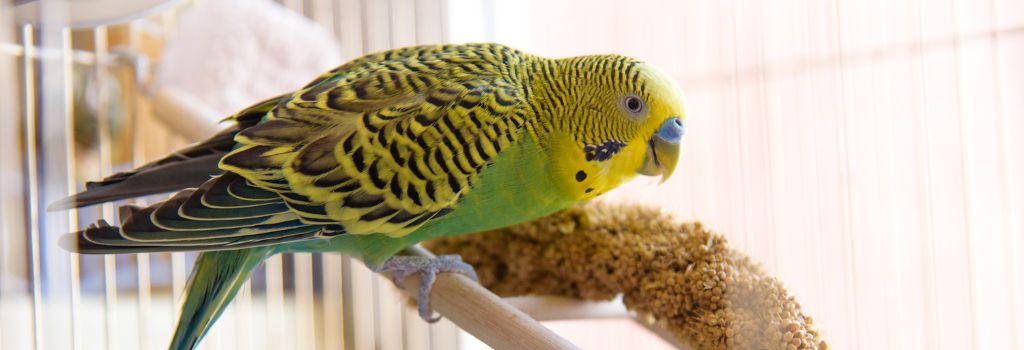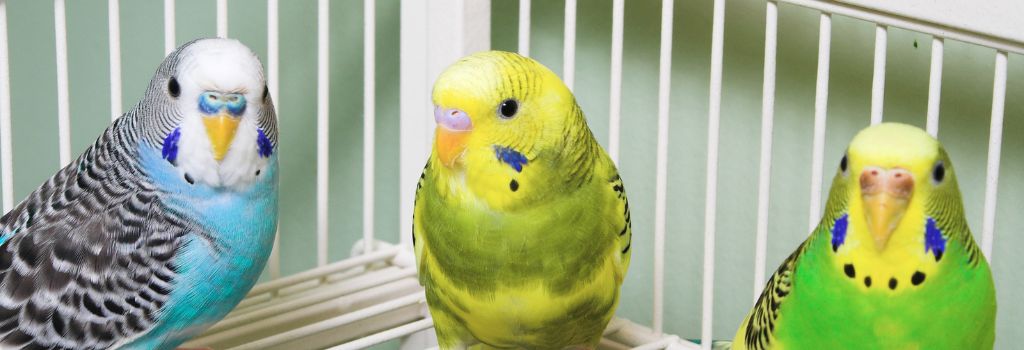Welcoming a feathered friend into your home is an exciting adventure, but it also comes with significant responsibilities. Birds are intelligent, social creatures that require dedicated care and attention. Whether you’re considering getting your first bird or you’re an experienced owner looking to brush up on best practices, this guide will help ensure you’re well-prepared for the joys and challenges of bird ownership.
Every bird species has unique requirements, but there are some fundamental needs that all pet birds share. As veterinarians, we often see new bird owners who are surprised by the level of care their pets require. It’s crucial to research your specific bird species thoroughly before bringing one home.
Keep reading to discover what birds need and what you need to be prepared for as a bird owner.
Housing
Your bird’s cage is more than just a place to sleep — it’s their primary living space. The cage should be large enough for your bird to spread their wings fully and move around comfortably. Horizontal bars are preferable as they allow for climbing. Consider bar spacing carefully to prevent escapes or injuries.
Inside the cage, provide a variety of perches of different diameters and textures to ensure foot health. Natural wood perches can offer both comfort and enrichment. Place food and water dishes where droppings won’t contaminate them.

Diet
A balanced diet is critical for your bird’s health. Many new owners make the mistake of relying solely on seeds, which can lead to nutritional deficiencies.
Most pet birds require a diet that includes:
- High-quality pelleted food formulated for their species
- A variety of fresh fruits and vegetables
- Limited amounts of seeds and nuts as treats
Provide fresh, clean water daily. Some birds enjoy bathing in their water dishes, so you may need to change the water frequently.
Environmental Needs
Birds are sensitive to their environment. Locate the cage away from direct sunlight and drafts, and maintain a temperature of 65-80°F (18-27°C), depending on your bird’s species. Many birds require a consistent light-dark cycle to maintain their health, so consider using a timer for cage lighting.
Humidity is another important factor. Many pet bird species come from tropical environments and benefit from higher humidity levels. A room humidifier or regular misting can help maintain appropriate humidity.
Health and Veterinary Care
Regular check-ups with an avian veterinarian are essential for maintaining your bird’s health. As veterinarians, we recommend annual exams for most pet birds, with more frequent visits for older birds or those with chronic health conditions.
Prepare for emergencies by having the contact information for an avian veterinarian and a 24-hour emergency clinic readily available.
Some common signs that your bird needs immediate veterinary attention include:
- Changes in eating or drinking habits
- Lethargy or decreased activity
- Puffed-up feathers for extended periods
- Changes in droppings
- Difficulty breathing
- Bleeding
Establishing a relationship with an avian veterinarian before an emergency strikes can make a big difference in your bird’s care.
Socialization and Enrichment
Birds are highly social creatures that require regular interaction and mental stimulation. Set aside time daily to interact with your bird outside their cage in a safe, bird-proofed area. This time is crucial for bonding and can include training sessions, play, or simply allowing your bird to be near you while you go about your daily activities.
Provide a variety of toys in the cage and rotate them regularly to prevent boredom. Foraging toys, puzzle feeders, and destructible toys will help satisfy your bird’s instincts and keep them mentally engaged.
Safety Considerations
Bird-proofing your home is an essential step in keeping your feathered friend safe.
Some key safety measures for birds include:
- Removing or securing toxic plants
- Avoiding non-stick cookware, which can release fumes toxic to birds
- Keeping windows and mirrors covered to prevent collisions
- Securing ceiling fans and other moving objects
- Removing small objects that your bird could swallow
- Keeping other pets separated from your bird
Always supervise your bird when it’s out of its cage, and be cautious of open doors and windows.

Grooming and Hygiene
Regular grooming is an important aspect of bird care that new owners sometimes overlook.
Depending on your bird’s species, you may need to:
- Trim wing feathers to prevent flight (consult your veterinarian about whether this is appropriate for your bird)
- Trim nails to maintain proper length
- Provide opportunities for bathing or misting to keep feathers clean and healthy
Some birds may require beak trimming, but only a professional should do this.
Long-Term Commitment
One of the most crucial things to understand about bird ownership is the long-term commitment it requires. Many pet bird species have long lifespans, with some parrots living 50 years or more. Before bringing a bird home, consider whether you can handle the long-term responsibility.
Additionally, birds can be sensitive to changes in their environment and routine. Major life changes like moving, getting married, or having a baby can be stressful for your bird. It is essential to plan for these potential changes and consider how they might affect your pet.
Financial Considerations
The costs of bird ownership extend far beyond the initial purchase price.
Be prepared for ongoing expenses like:
- High-quality food and treats
- Regular veterinary check-ups and potential medications or treatments
- Cages, perches, and toys (which may need frequent replacement)
- Grooming supplies
- Boarding costs if you travel
As veterinarians, we often see birds suffering from preventable health issues due to inadequate care. Many of these issues stem from owners underestimating the financial commitment of properly caring for a bird.
Emotional Preparedness
While birds make lovely companions, they can also be challenging pets. They can be noisy, messy, and demanding of your time and attention. Some birds go through hormonal changes that can lead to temporary behavioral issues. Being emotionally prepared for these challenges and committed to working through them with patience and understanding is important.
Final Thoughts
Owning a bird can be an enriching experience but requires careful preparation and ongoing dedication. Understanding and meeting your bird’s needs is vital for creating a healthy, happy home for your feathered friend.
Are you considering adding a bird to your family? Or do you have questions about caring for your current pet bird? If so, schedule an appointment with our team today! We’re here to support you in providing the best possible care for your avian companion throughout their life.
Don't have a vet in your area yet? We can help you find a local veterinarian.
If you have more questions, the GeniusVets Teletriage platform will give you unlimited access to text and/or video calls with board-certified veterinarians! To learn more click here.
This information was first seen on University Animal Clinic.
